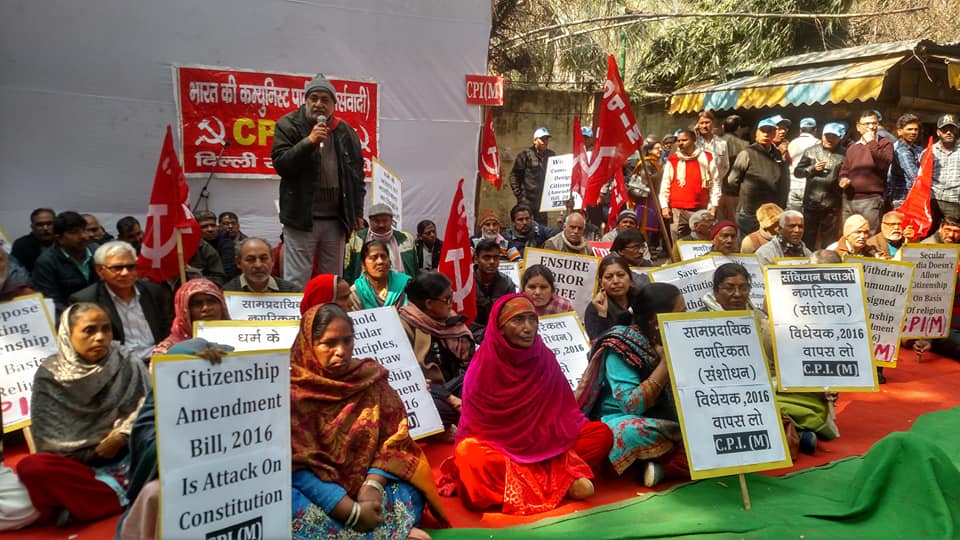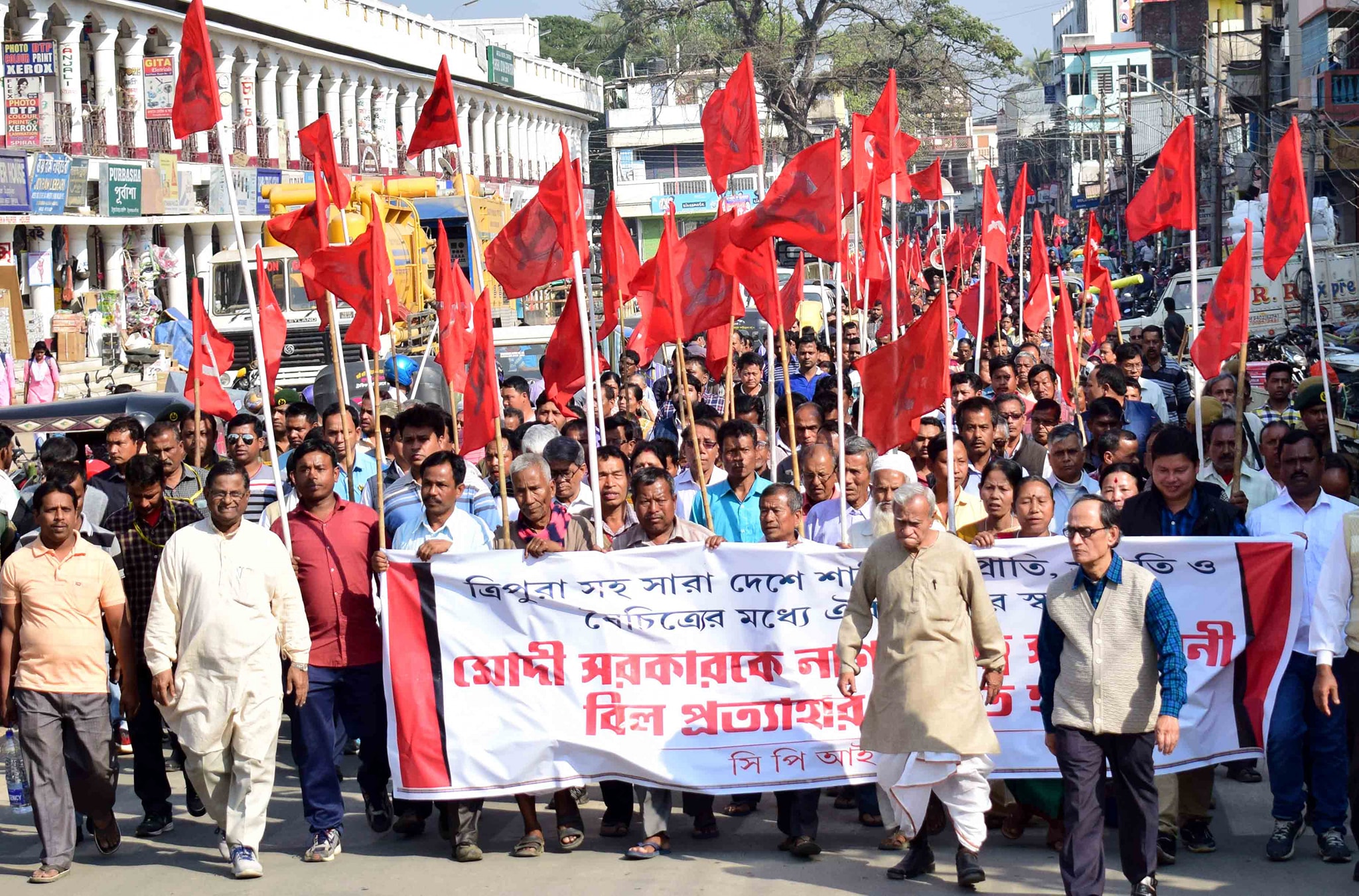All across India, protests and demonstrations were held on February 4 opposing the Citizenship (Amendment) Bill (2016), in a call given by the Communist Party of India (Marxist).
The bill presented by the ruling Hindu conservative Bharatiya Janata Party (BJP) aims to grant citizenship to all undocumented, non-Muslim immigrants who entered the country before December 31, 2014, from the neighboring countries of Afghanistan, Pakistan, and Bangladesh. It specifies six religious groups to be eligible for citizenship – Hindus, Sikhs, Parsis, Jains, Buddhists and Christians.
At the protest in New Delhi, member of Parliament Tapan Sen said, “there are various instruments that the BJP is using to do all it can to divide the country. The Citizenship (Amendment) Bill is just one of those efforts among others, such as Cow protection, etc”.
Earlier, on December 28, 2018, the Left Democratic Manch, Assam –a common platform of 10 political parties, including the CPI(M), the Communist Party of India (CPI) and Communist Party of India (ML) Liberation– staged a protest against the Citizenship bill in New Delhi’s Jantar Mantar.
Despite the protests, the bill was hurriedly passed by India’s Lok Sabha, the lower house of the parliament, on the last day of the parliament’s winter session on January 8. This controversial move has been seen as an attempt to polarize the country along religious and ethnic lines.
The right-wing BJP holds an absolute majority in the Lok Sabha, and is primarily responsible for the introduction and passage of this bill. BJP president, Amit Shah, has repeatedly referred to Muslim immigrants in his speeches as ‘infiltrators’ and Hindus as ‘refugees’, choosing no other criteria for defining a refugee apart from religion.
Protests against the bill were also staged in Himachal Pradesh, Assam, Manipur, among other states.
A bike rally in protest against the bill was also organized by Manipuri Youth Front Association (MYFA), Silchar, Assam. More than 100 bike riders took part in the rally which also witnessed the participation of representatives and members of All Assam Koch Rajbongshi Students’ Union (AAKRASU) and Nikhil Bishnupriya Manipuri Students Union (NBMSU). The participants at the bike rally were seen holding placards condemning the bill while also chanting the slogan, “BJP Go Back!” amongst others.
Speaking with Peoples Dispatch, Suprakash Talukdar, CPI(M) state committee head in Assam said, “Rallies are being held across the country, there is one in Guwahati as well. The message being sent out today is clear that there is absolutely no acceptance of the BJP’s politics of hate. We believe that the Citizenship (Amendment) Bill is an attempt to target the stability in Northeast and to create an unnecessary disturbance, in order to shift attention from the real issues of dissatisfaction that people have with the central government.”
The bill may have been pushed through the Lok Sabha, but it is unlikely to pass as easily in the upper house of parliament, the Rajya Sabha, where the BJP is not in majority.

The passing of this bill by the majoritarian BJP is feared to be another move towards creating a Hindu state, which has been the long stated goal of BJP’s ideological parent organization, the Rashtriya Swayamsevak Sangh (RSS). It is also drawing comparisons to Israel’s policy of granting citizenship to all the Jews who wish to reside in the occupied territories, while forcefully displacing Palestinians.
By using religion as the basis for classification, the bill is in clear contravention of the Indian Constitution which declares the country to be secular in its preamble. What he is telling is that Hindus are the BJP’s major vote base, and four of the six religions included in the bill for relaxation of citizenship norms come under the Hindu personal law.
Dr. Onkar Shad, state secretary of CPI(M) in Himachal Pradesh, said, “This bill violates the general basis of giving citizenship without discrimination in the name of caste, creed, gender, ethnicity and culture. Due to religion based identification as proposed by the Bill, there is a threat to unity in diversity.”
Ahead of the upcoming Lok Sabha elections, due in the next couple of months, it is evident that the intent behind the rushed passage of the bill, despite opposition and tensions, is to appease BJP’s voter base. Creating communal discord is an old electoral strategy of the BJP.
While the BJP claims that its reasoning behind this bill is granting protection to persecuted minorities in other countries, the bill does not draw any distinction between refugees and undocumented immigrants seeking residence for other reasons, such as economic ones.
Another giveaway is the fact that the Narendra Modi led government has not shown similar sympathy to Rohingya Muslims seeking refuge in India, who are currently facing immense hardship due to the religious persecution being meted out to them by majoritarian Buddhists in Myanmar.
India shares a soft border with Bangladesh, which allows a relatively easier flow of migrants. On orders of the Indian Supreme Court, the updated National Register of Citizens (NRC) was published in late 2017 as a way of identifying undocumented immigrants. The final updated list, which came out in July 2018, left 4 million people out of the NRC.
It is estimated that a majority of the alleged foreigners are Bangladeshi Hindus, a vote base that the BJP does not want to give up so easily. The pushing of the bill before the NRC process is completed is being seen as a way of protecting that voter base.
Apart from changing the definition of an undocumented immigrant, the amendment also relaxes other citizenship requirements for these groups. One way of obtaining Indian citizenship is by the process of naturalization, which requires the person to have stayed in India for eleven years. But the new provision relaxes this requirement to 6 years for the selected religious groups. This comes across as a targeted way to exclude religious minorities, such as Muslims and Jews, in India.
Since the bill’s introduction in the parliament in July 2016, there has been widespread opposition and unrest in different parts of India. The north eastern states are seeing the worst of this violence since they have had a long history of unrest with Bangladesh as well as India over issues of indigenous identity and political representation.
The north eastern region has a significant population of indigenous and tribal people. The people fear that the bill will lead to a higher influx of migrants into the region, which would further undermine their representation in the country’s politics and result in overlooking of their needs.
The forced assimilation of this population has been eroding the local culture and language. The locals have been guaranteed protection from this in the Assam Accord that was signed in 1985 after a 6-year agitation as well as the United Nations Declaration on the Rights of Indigenous Peoples (UNDRIP), to which India is a signatory.
The north eastern region has been seething since India’s independence from British colonial rule with many struggles for regional autonomy still going on. These struggles have flared up on various occasions and taken violent turns. In a period of relative calm, the BJP’s actions are again provoking further radicalization and bloodshed.
President of Nikhil Bishnupriya Manipuri Students Union (NBMSU), Rajib Sinha stated, “At a time when efforts to protect the indigenous people of Barak valley [in Assam] are proving hard, the passing of the Citizenship (Amendment) Bill has raised apprehensions and fears that the total eradication of the indigenous people will surely ensure. So, we will fight till death if the Bill is passed [in the upper house of parliament].”
Across all the north eastern states, there have been multiple statewide shutdowns in opposition to the bill. There have been various peaceful protests and marches, but the demands and the concern of the locals have been completely ignored. Instead of engaging in any kind of dialogue, the government has in the past resorted to violent crackdowns on many of the protestors.
The North East Students Organization (NESO), an umbrella group of all major student and youth fronts in these states, gave a call for shutdown in all eight states of the north east for January 8 after the BJP announced its decision of tabling the bill in the parliament. In Tripura, the Tripura Students Front picketed in different places and blocked a national highway. They were met with tear gas and four rounds of bullets, resulting in four protesters sustaining bullet injuries.
Intellectuals and activists who have raised their voice against the bill have also met with a similar fate. Prominent public intellectual Hiren Gohain, peasants’ rights activist Akhil Gogoi and journalist Manjit Mahanta were charged with sedition for making “secessionist” comments. At a rally on January 7, Gohain’s speech was interrupted by angry youth demanding independence for the state of Assam. Gohain clarified in a public statement that he was trying to calm down tempers while asking the youth to voice their demands in a democratic manner.
Gohain is also a petitioner in the case filed against the amendments made to the Passport (Entry into India) Rules, 1950 and the Foreigners Order, 1948. These amendments, passed in 2015, designate all Hindus, Sikhs, Parsis, Jains, Buddhists and Christians coming from Afghanistan, Bangladesh and Pakistan as ‘refugees’. These changes were made in a hushed manner, and relaxed the rules regarding the entry and stay of members of the six religious groups in India.





